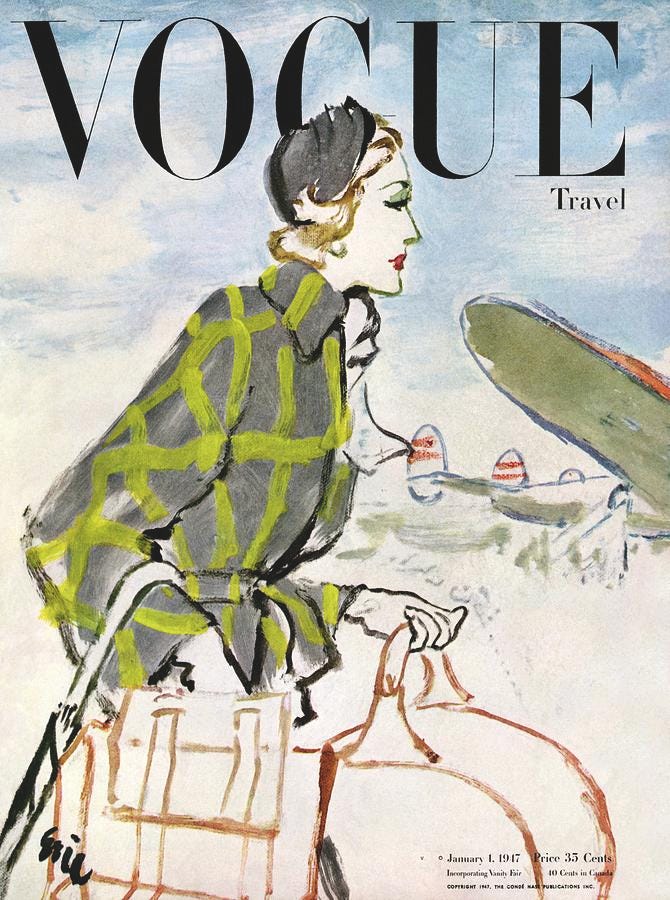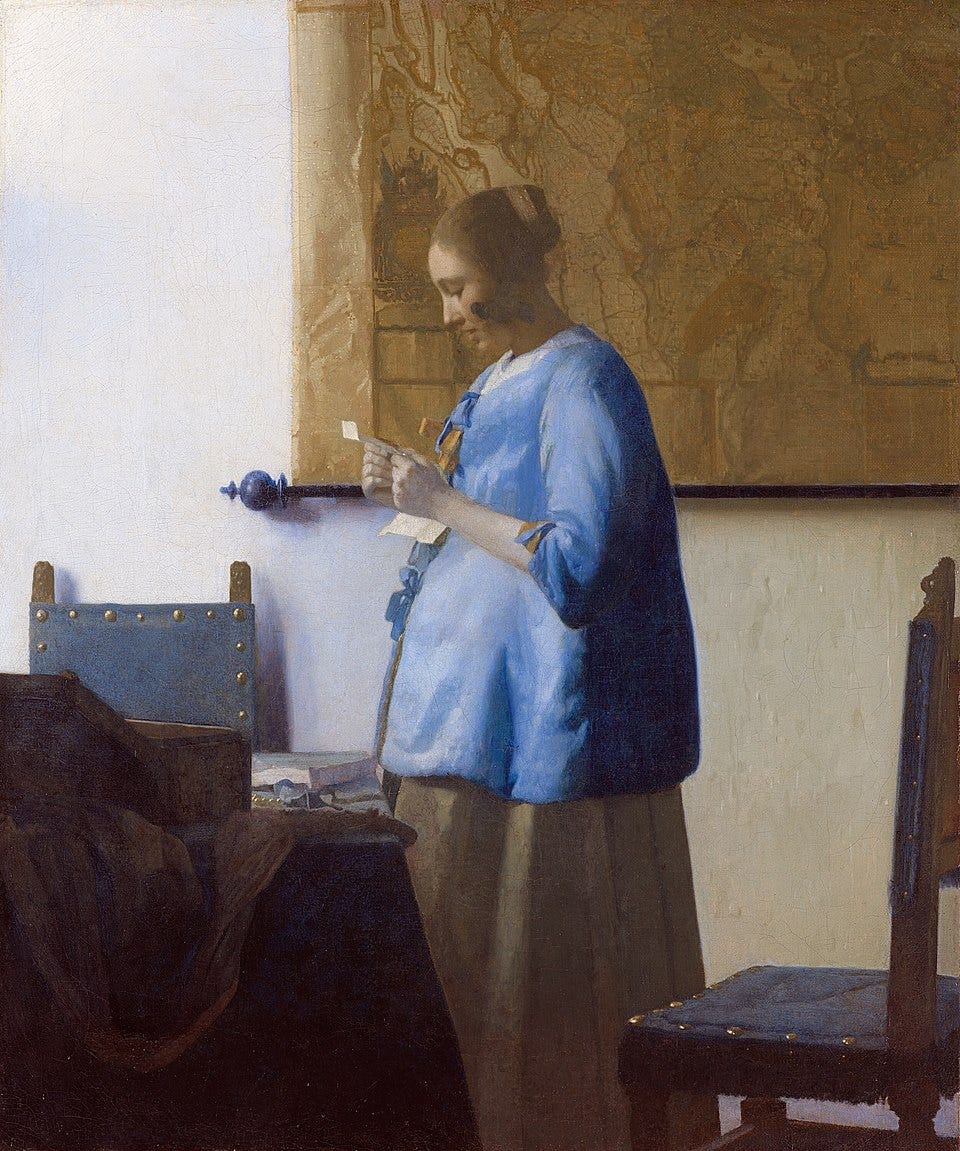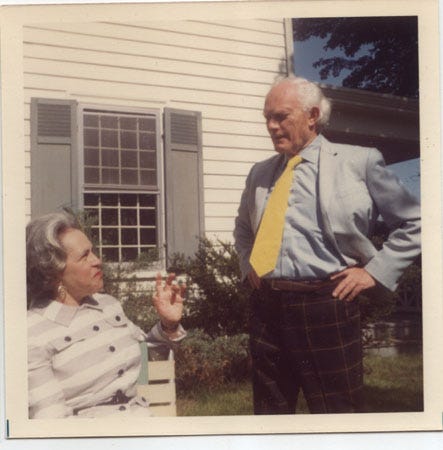It's Not My Problem
You're a grownup. Me too. Let's skip search and rescue and get to the fun stuff.

The airport limo was waiting at the door and for once we were ready to go. Bags packed, fridge cleaned out, Euros tucked in their envelope. As I checked my passport for the hundred-and-forty-seventh time, my husband said, “Oh, right. Better grab my passport.”
Thirty more seconds to go.
Drawers clattered in the next room. Closet doors slammed between muttered curses. Time for a helpful, wifely suggestion: “Where was it when you last saw it, dear?”
I married an organized guy. He has run four magazines, hired and fired people like me. We travel nowhere without itineraries he has researched to the last detail. You’ve got this, Paul. Haven’t you?
Fifteen minutes on, there wasn’t one hidey-hole left to search. I pictured the plane taking off for Amsterdam without us. The suite overlooking the canal, a splurge for our anniversary—dark as the shadows in a Rembrandt.
I threw myself on the carpet, like a toddler headed for a long time out, and let loose an operatic howl.
Had my mother been in my place, you can bet she’d have hunted for the passport. Day after day, she hunted for my father’s misplaced keys, gloves, lecture notes (“Where were they when you last saw them, dear?”). She reminded him one more time to mark his students’ final exams, that unruly pile of blue books tucked away in a corner. Called in sick on his behalf while he nursed a hangover. As she coddled and protected, anger bloomed like a toxic flower behind the mask of her smile.
My mother sent two daughters into the world. After 25 years with my father, she was done playing nursemaid to an alcoholic child. She threw him out, fearful that he couldn’t manage on his own. He’d grown old and arthritic without setting foot in a bank since they married. Retirement had taken the classroom where his teaching used to dazzle. In therapy, my mother came to see that tending a husband served her ego. His fecklessness nourished the illusion that she had the power to control him.
My father blossomed on his own. He gave the best of himself to his first love, painting. After a lifetime of obscurity, Max Maynard attracted gallerists and collectors. He had given up hope of such a marvel. My mother had finally set him free.
Face-down on the floor, I had a lightning-bolt insight: Whose problem was the passport, anyway?
I told my husband, now preoccupied with Ransacking 2.0, “I’m getting on that plane no matter what. When you find your passport, meet me in Amsterdam.”
I’ve never relished a flight as I did the one that carried me away from my husband’s missing passport and my long-dead mother’s grim example. The faux bubbly in my plastic flute might as well have been Dom Pérignon. Anne Sexton wrote in “Housewife,” a poem of chilling perspicacity, “A woman is her mother. /That’s the main thing.”
Please, no.
I’ve regaled many women with the tale of the passport. They could hardly believe I’d left Paul behind. My lawyer friend Audrey, whom I called from the departure lounge, did not even wait for the end of the yarn before declaring, with finality: “So. You’re still home.” She was hosting a party the next night, and I wanted her to know that Paul could likely make it after all. I hadn’t quite forgotten childhood training in the care of husbands.
O me of little faith. He caught up with me in 22 hours.
To live is to lose. Elizabeth Bishop wrote a haunting villanelle, “One Art,” in which the loss of everyday objects becomes a warmup for disaster, the loss of a partner.
Lose something every day. Accept the fluster
of lost door keys, the hour badly spent.
The art of losing isn’t hard to master.
Bishop, who died in 1979, never lost a cell phone (mine goes missing almost daily, the reason I can’t quit my landline). Nor did she keep tabs on a remote—the object Americans misplace most often, according to a survey in 2017. Those hours badly spent add up an average of 2.5 days per year. Lost objects cause more than 60 percent of Americans to be late for work or school with some regularity, and a third to fight with their spouse. Familiar items nail your day together. How solid it appears—until one piece is nowhere to be found, and the whole edifice begins to quiver.
Women often ask how Paul felt when I headed for the limo without him. Not one man has ever asked. Men can feel Paul’s relief: no more frantic, finger-wagging partner on his case, recasting the search as a Teachable Moment (“The time to find your passport is a week before the trip”). Without me, Paul recovered his mental focus.
He returned to the place where he’d last seen the passport—the leather portfolio where it lived in a dedicated pocket. This time he remembered applying for a new provincial health card with the passport as government-issued ID. Distracted by the bureaucratic pressures of the moment, he shoved the passport back into the wrong pocket. There he found it—too late for our flight, but on time for all the pleasures we meant to share in Amsterdam.
Toward dawn on my first night there, I awoke from jet-lagged slumber to the clatter of Paul’s suitcase up a steep flight of stairs. He fell into the bed with a drowsy kiss, and there he stayed while I took my sweet time at Anne Frank House. Anne had never been a friend to him, as she was to me long ago. This was one pleasure best enjoyed on my own.
I stood at the attic window, looking out at the huge chestnut tree that gave Anne hope in more than two years of hiding. The chestnut, among the city’s oldest, would fall within a few years, weakened by disease. But that day I saw it through the eyes of a young girl beside a boy named Peter, her first, fleeting and only love: “The two of us looked out at the blue sky, the bare chestnut tree glistening with dew, the seagulls and other birds glinting with silver as they swooped through the air, and we were so moved and entranced that we couldn’t speak.”
At coffee time, I stepped into the pearly Dutch light I knew from paintings on museum walls. By the time I returned to our suite under the eaves, I’d have found us a café and a bistro. We’d clear our heads with a stroll on the canal. Tomorrow we’d be ready for the Rijksmuseum, where a woman who might be pregnant, dressed in that transfixing blue only conjured by Vermeer, is reading a letter forever. And we would wonder, along with multitudes past, present and future, what sort of news she’s taking in. So entranced that we couldn’t speak.

Well, friends, I wonder where you’ll take this conversation. Lost passports and dramas that ensued? Some other essential object that slipped through the cracks of preoccupation? The hazards of managing a perfectly competent spouse? Let the comments take flight. You’ll hear back from me, I promise.
A find freak who calls himself Professor Solomon has written a lively little e-book, How to Find Lost Objects, that explains the theory behind Paul’s discovery of the passport. Read it free here. If you’d prefer secrets of a long-lasting marriage, I’ve got a few over here. “Never go to bed angry” is not among them.
In three days we fly to Spain. Weekly posts resume on my first Sunday back, October 12. In the meantime, I’ve comped all paid subscribers for five weeks, one for each post I missed due to renovation chaos and travel.
If you feel moved to pay, I’d be honored and delighted. Not the time, not in your budget? There are other ways to support Amazement Seeker. Leave a comment, click the heart, share this post with a friend. Anyone can enjoy any post for free. See you in two weeks. I’ll be responding from Spain, between tapas and Goya.





Have a wonderful trip, Rona. I, too, would ask, was Paul angry that you left him behind? The kiss on arrival gave me a clue, that if he was, he'd recovered. My favorite part of your essay today is that you DID leave him behind. I don't know if I could have made that bold choice. My codependence runs deep. I leave things behind on occasion, but I tend to do that with things I know I won't return to. Big difference. In addition to codependence, I'm conflict avoidant too!
"I threw myself on the carpet, like a toddler headed for a long time out, and let loose an operatic howl." Did you really? Is it weird that I can picture that vividly, and also not at all? Rona, the more I get to know you, the more fascinating you become. So much love to you. xo
Oh Rona, this brings back an occasion I had long forgot. I was keen to explore England when we got here and my husband concurred, but it was never the right moment. So I did some research, looked at a map and saw where was the closest bit of good countryside to London and said, right, we're going there this weekend. I chose a town to head for. He said fine, but on Friday he said he had some work he had to do. Right, I said, I am going ahead and you can meet me tomorrow.
I headed to the railway with my bag, our three year old daughter and her stroller. Great move! Only, we had to change trains (we didn't own a car) and the passenger announcement system was terrible while I struggled with all the things (and daughter) and we ended up taking the wrong train to a completely different place. Worse than that, there were no hotels available where we had landed, because there was a big conference on. I remember sitting in the railway cafe waiting for the train to take us back to the junction, very very low and my daughter said, "don't worry, Mummy, I'll look after you".
Brings tears to my eyes writing this. Eventually, we got on the right train, arrived in the town too late to stroll around to look for a B&B, so I looked in a telephone directory and chose a hotel by its name. Turned out to be an old-fashioned residential hotel for old people, but they were very nice, offered to send a car to get us and gave us a lovely room and breakfast. We lowered the average age by miles. Daughter well fussed over.
Husband arrived the next morning with a big smile and we had a lovely weekend. The place I had chosen was the Peak District, not much known in those days but better known now, and a gorgeous area of England.
We do need to assert ourselves from time to time. The mother of a friend in school (she reminded me of Auntie Mame) once pronounced "A woman should assert herself early in the marriage!". That was funny at the time, but also very right.